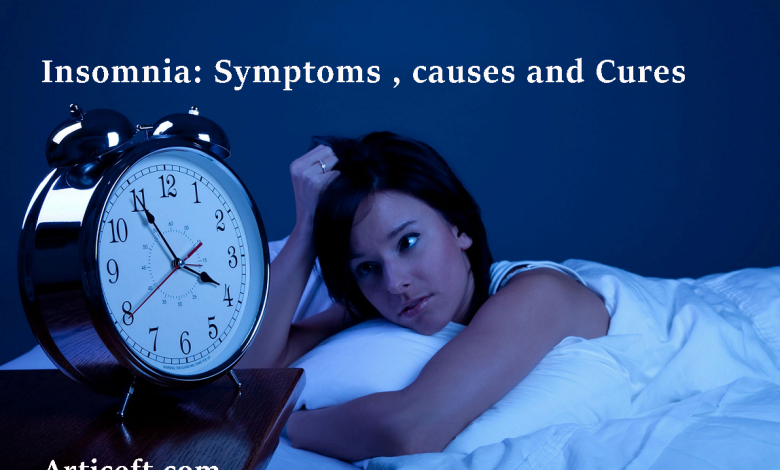Insomnia – Symptoms , causes and Cures

Insomnia is a sleep disorder that affects millions of people, both adults, and children. It is characterized by difficulty falling asleep, waking up frequently during the night, staying awake for long periods during the night, or waking up too early in the morning. Insomnia can last for days, weeks, or even months at a time and can lead to decreased energy, stress, and anxiety.
Insomnia can be caused by a variety of factors such as stress, anxiety, or medical conditions. It can also occur due to lifestyle choices such as working long hours or consuming caffeine late in the day. Some medications may also cause insomnia, so it is important to discuss with your doctor any medications you are taking that may affect your sleep.
Symptoms of Insomnia
- Difficulty falling asleep or staying asleep
- Waking up too early in the morning and having difficulty returning to sleep
- Unrefreshing sleep that leaves you feeling tired throughout the day
- Feeling irritable or groggy during the day
- Difficulty concentrating and focusing on tasks
- Low energy levels throughout the day
- Changes in appetite or weight.
- Anxiety and depression related to lack of sleep
- Racing thoughts that make it difficult to fall asleep or stay asleep
- Decreased performance at work or school due to poor sleep quality.
Causes Of Insomnia
Stress: Stress from work, school, family, or lifestyle choices can make it difficult to fall asleep and stay asleep.
Anxiety: Anxiety can trigger racing thoughts that make it hard to shut down for sleep.
Poor Sleep Habits: Having an irregular sleep schedule, spending too much time in bed, and not getting enough exposure to natural light can all have an impact on the quality of sleep.
Diet: Eating too close to bedtime, caffeine or alcohol consumption, and eating unhealthy foods can interfere with the body’s ability to wind down for sleep.
Hormones: Changes in hormones during menopause or pregnancy can affect sleep.
Illness: Medical issues such as chronic pain, acid reflux, asthma, and other health conditions can cause insomnia.
Medication: Some prescription medications have side effects that disrupt sleep cycles.
Environment: External factors such as noise levels, temperature, and light can all affect sleep.
Aging: As people age, their sleep patterns often change due to hormonal changes or other medical conditions that become more common with age.
Sleep Apnea: Sleep apnea is a disorder that causes disruptions in breathing during sleep, which can interrupt sleep and cause difficulty falling or staying asleep.
This list of causes of insomnia is not exhaustive and there may be other underlying causes as well. If you’re having trouble sleeping, it’s important to speak with your doctor to find out the underlying cause. With the right diagnosis and treatment plan, you can start getting a better night’s sleep.
Cures For Insomnia
- Establish a consistent sleep routine: Going to bed and waking up at the same time each day helps to regulate your sleep-wake cycle, improving the quality of your sleep.
- Avoid screens before bed: Exposure to blue light from electronic devices can suppress the production of melatonin, making it hard for you to fall asleep.
- Exercise regularly: Regular aerobic exercise can help improve the quality of your sleep and reduce the time it takes you to fall asleep.
- Create a comfortable sleeping environment: Keeping your bedroom dark, cool, and quiet will make it easier for you to get to sleep and stay asleep throughout the night.
- Reduce stress and anxiety: Practices such as yoga, meditation, and relaxation exercises can help reduce stress and improve sleep quality.
- Avoid caffeine late in the day: Caffeine can stay in your system for up to 8 hours, making it difficult to fall asleep if you consume it too late in the day.
- Avoid naps during the day: While short power naps can be beneficial, avoid taking long naps in the afternoon as this can make it harder for you to fall asleep at night.
- Don’t eat late at night: Eating a heavy meal late in the evening can interfere with your sleep.
- Talk to your doctor: If you’ve tried the above tips and are still having difficulty sleeping, make an appointment with your doctor to discuss other treatment options such as cognitive behavioral therapy or medications
- Get outside during the day: Spending time outdoors in natural light during daylight hours can help regulate your body’s internal clock and improve sleep quality.
By following these tips, you can reduce the symptoms of insomnia and start to enjoy better restful sleep. You may even find that other areas of your life, such as work performance, social life, and mood, also benefit from improved sleep. If you are still having difficulty sleeping, speak to your doctor for further advice. There are also several online insomnia counseling available. These therapists can help you create a plan to take control of your sleep and tackle any underlying issues that may be preventing you from getting the restful sleep that you need.




